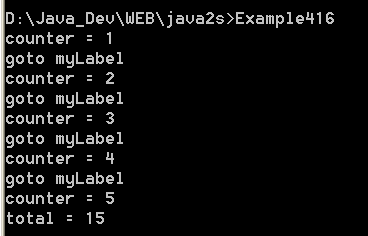#define, #if, and #endif preprocessor directives

/*
Mastering Visual C# .NET
by Jason Price, Mike Gunderloy
Publisher: Sybex;
ISBN: 0782129110
*/
/*
Example4_16.cs illustrates the use of the
#define, #if, and #endif preprocessor directives
*/
#define DEBUG
public class Example4_16
{
public static void Main()
{
int total = 0;
int counter = 0;
myLabel:
counter++;
total += counter;
System.Console.WriteLine("counter = " + counter);
if (counter < 5)
{
#if DEBUG
System.Console.WriteLine("goto myLabel");
#endif
goto myLabel;
}
System.Console.WriteLine("total = " + total);
}
}
Related examples in the same category